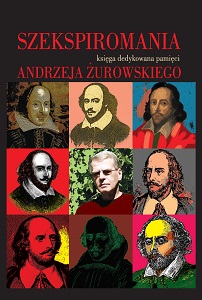Conflict and Rhetoric. On the Structuring of Roles in Conflict in Shakespeare’s (Non)dramatic Poetry
Conflict and Rhetoric. On the Structuring of Roles in Conflict in Shakespeare’s (Non)dramatic Poetry
Author(s): Jacek Fabiszak
Subject(s): Theatre, Dance, Performing Arts, Cultural history, Theoretical Linguistics, Applied Linguistics, Studies of Literature, Philology, Theory of Literature, British Literature
Published by: Wydawnictwa Uniwersytetu Warszawskiego
Keywords: conflict; theatre; Shakespeare plays; English Renaissance education system; Shakespeare
Summary/Abstract: It appears that conflict, so fundamental in drama and theatre, assumes a theatrical vest in Shakespeare’s dramatic and non-dramatic poetry. It does not matter what the nature of the conflict is: be it military, moral, ethic, etc. It does not matter either whether there are at least two conflicted characters, as the conflicted parties, especially in the case of poetry, can be contained within a single lyrical I. The key issue in the structuring of roles in conflict is of course the omnipresent rhetoric, which was an obligatory subject in the English Renaissance education system. For this reason, neither Shakespeare (who probably did go to King’s New School in Stratford) or his contemporaries (e.g. Christopher Marlowe) were well versed in it and purposefully or inadvertently employed it in their works, especially in the situation of VERBAL conflict when one party tried to argue with another. In such a conflict, characters, or their alter egos, posed as if they were actors on stage. The scrutiny centres on two examples of Shakespeare’s poetry: a sonnet (nondramatic verse) and a monologue from Macbeth (dramatic poetry). I will try to show how in each case, with the help of rhetorical rules, the speaker constructs his interlocutor in the process of solving a conflict.
Book: Szekspiromania. Księga dedykowana pamięci Andrzeja Żurowskiego
- Page Range: 262-273
- Page Count: 12
- Publication Year: 2013
- Language: English, Polish
- Content File-PDF

